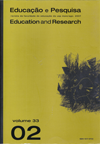A formação do homem no Emílio de Rousseau
DOI:
https://doi.org/10.1590/S1517-97022007000200010Palabras clave:
Rousseau, Emílio, Formação do homem, Educação modernaResumen
Desenvolvida inicialmente como um capítulo da dissertação de mestrado, a temática deste artigo diz respeito à dimensão humana que o projeto educacional rousseauniano procura desenvolver. Mesmo objetivando a formação do cidadão (tese que a dissertação procura defender), o plano político e pedagógico de Rousseau busca englobar o desenvolvimento dos talentos naturais como próprios da natureza humana. O artigo tem como fonte básica o livro Emílio ou da educação, de autoria do filósofo genebrino Jean-Jacques Rousseau. Apoiado também nos demais escritos, compilados na obra Oeuvres complètes, o texto procura resgatar a importância dessa temática para a educação da atualidade, bem como a importância do pensamento de Rousseau para a discussão em torno dos objetivos da formação do homem moderno e dos princípios que permeiam os processos formacionais. Realça que o projeto de humanização presente na obra de Rousseau é de caráter político e, portanto, contribui para que o processo educacional e os modos de inserção e participação do homem no meio social sejam repensados em nossos dias. No entanto, a ação política bem como a pedagógica devem ser empreendidas no sentido de se redimensionar as potencialidades naturais do homem de maneira que a natureza humana não seja degenerada, ignorada ou até mesmo coisificada. Construir sentidos para a existência humana e pensar a melhor maneira de participação no meio social devem, nesse sentido, ser a principal preocupação de todo e qualquer projeto político-educacional.Descargas
Los datos de descarga aún no están disponibles.
Descargas
Publicado
2007-08-01
Número
Sección
Artículos
Licencia
Los conceptos emitidos en los artículos son de exclusiva responsabilidad de sus autores y no reflejan necesariamente la opinión de la redacción.
Está permitida la reproducción total o parcial de los trabajos, siempre y cuando se indique explícitamente la fuente.
Cómo citar
A formação do homem no Emílio de Rousseau . (2007). Educação E Pesquisa, 33(2), 323-333. https://doi.org/10.1590/S1517-97022007000200010



